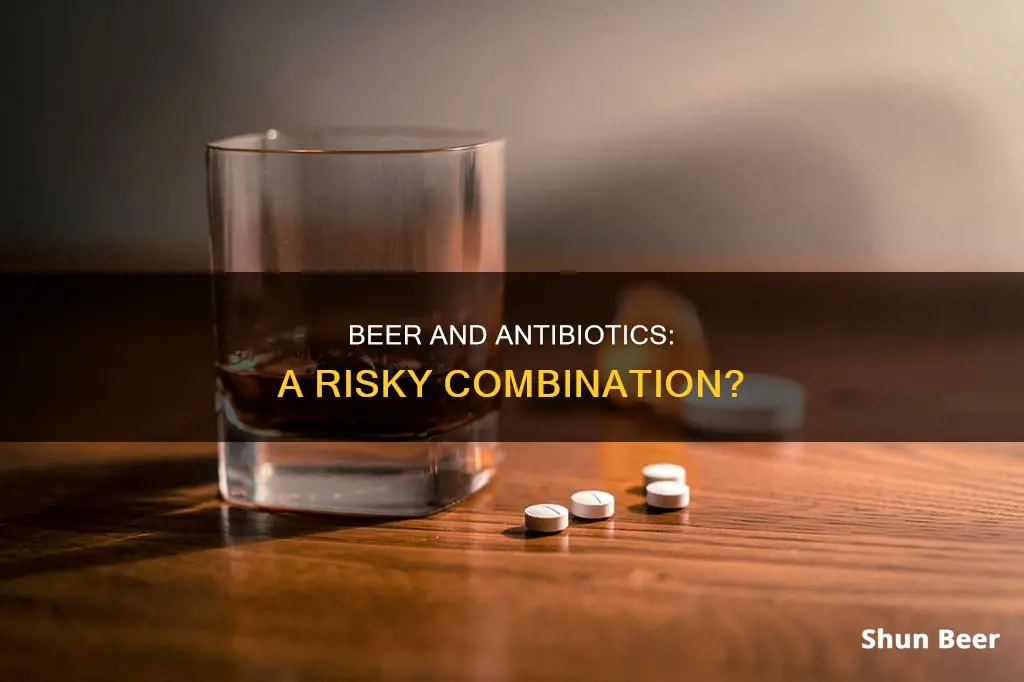
Drinking alcohol while taking antibiotics is generally not recommended, as it can negatively impact your recovery from illness in several ways. While moderate alcohol consumption usually doesn't reduce the effectiveness of most antibiotics, it can cause side effects such as digestive problems, nausea, and vomiting. Additionally, alcohol can disrupt sleep patterns and affect nutrient absorption, both of which are essential for healing. It is best to avoid alcohol, especially when taking specific antibiotics like metronidazole and tinidazole, which can lead to extreme nausea and vomiting when combined with alcohol.
| Characteristics | Values |
|---|---|
| Effect on antibiotic effectiveness | Alcohol does not usually affect the effectiveness of antibiotics, but it can lead to unpleasant side effects. |
| Effect on recovery | Alcohol can slow down recovery from illness by causing dehydration, interrupting sleep, and reducing energy levels. |
| Effect on immune system | Alcohol can weaken the immune system, making it easier to pick up contagious illnesses. |
| Side effects | Alcohol can worsen the side effects of antibiotics, such as nausea, digestive issues, and cognitive function impairment. |
| Safe antibiotics to mix with alcohol | It is unlikely that drinking alcohol in moderation will cause problems with the most common antibiotics. |
| Antibiotics to avoid mixing with alcohol | Metronidazole, tinidazole, linezolid, doxycycline, and erythromycin. |
What You'll Learn

Metronidazole and alcohol can cause a dangerous reaction
Metronidazole is a commonly prescribed antibiotic used to treat a variety of infections, including stomach or intestine, skin, joint and lung infections. It is known to cause a disulfiram-like reaction when mixed with alcohol, which can be dangerous.
The disulfiram-like reaction is caused by a build-up of acetaldehyde, a toxic by-product of alcohol, in the body. This happens because metronidazole and alcohol both block the enzyme aldehyde dehydrogenase, which is responsible for breaking down acetaldehyde. When this enzyme is blocked, acetaldehyde accumulates in the body, leading to a range of unpleasant symptoms such as flushing, nausea, vomiting, stomach cramps, abdominal pain, tachycardia, throbbing headaches, and in severe cases, respiratory depression, cardiovascular collapse, arrhythmias, convulsions, and even death.
While the exact mechanism of the disulfiram-like reaction is not fully understood, it is clear that mixing metronidazole and alcohol can be dangerous and should be avoided. Healthcare professionals recommend not drinking alcohol during metronidazole treatment and for at least 3 days after finishing the course. This is because the reaction can be serious and even life-threatening, and there is currently no way to predict who is more susceptible to experiencing it.
It is important to note that there is some controversy around the disulfiram-like reaction with metronidazole. While some studies have shown serious problems, others have found no evidence of the reaction or suggested that it may only occur in a small subgroup of people. However, due to the potential seriousness of the reaction, it is best to err on the side of caution and avoid alcohol while taking metronidazole.
Pensacola Beach's Beer Laws: Drinking Scenarios Explained
You may want to see also

Alcohol can slow recovery from illness
Drinking alcohol while you're sick is generally not a good idea. Alcohol can negatively impact your body's ability to heal from an illness in several ways. Firstly, it can disrupt your sleep patterns, preventing you from getting a good night's rest, which is essential for recovery. Additionally, alcohol can interfere with your body's ability to absorb vital nutrients, increase your blood sugar levels, and deplete your energy levels, all of which can hinder your recovery process. Acute alcohol use, binge drinking, and chronic alcohol consumption can all have harmful effects on your health, regardless of whether you are taking medication or not.
Alcohol can also cause dehydration, upset your stomach, and lower your immune response, making it harder for your body to fight off infections. This is especially important when taking antibiotics, as your body relies on its natural healing abilities to recover from infection. While moderate alcohol consumption may not significantly reduce the effectiveness of most antibiotics, it is best to avoid alcohol until you have completed your course of antibiotics to prevent any potential complications or side effects.
Furthermore, drinking alcohol while taking certain antibiotics can lead to unpleasant and potentially dangerous side effects. These side effects may include flushing of the skin, stomach cramps, nausea, vomiting, difficulty breathing, and liver damage. Some antibiotics, such as metronidazole, tinidazole, cefoperazone, cefotetan, and ketoconazole, are known to cause a "disulfiram-like reaction" when mixed with alcohol, which can be severe. It is crucial to follow your healthcare provider's instructions and check with your doctor or pharmacist before consuming alcohol with any medication.
In addition to the direct effects of alcohol on the body, it's important to consider the interaction between alcohol and other medications, including common cold and flu medications. Combining alcohol with certain over-the-counter or prescription drugs can be dangerous and lead to negative side effects. For example, acetaminophen, a common pain reliever and fever reducer found in many cold and flu medications, can cause liver damage when mixed with alcohol as they are both metabolized in the liver. Therefore, it is essential to read the labels on all medications and be cautious when consuming alcohol while taking any medication, including antibiotics.
Beer and Boils: Is There a Connection?
You may want to see also

Alcohol and antibiotics can cause extreme nausea and vomiting
These side effects can be dangerous and disruptive to your health and daily life. It is best to avoid alcohol until you have finished your course of antibiotics to reduce the risk of these harmful effects. This is especially important if you are taking antibiotics that can have a dangerous reaction with alcohol, such as metronidazole, tinidazole, cefoperazone, cefotetan, and ketoconazole.
The specific side effects that occur when combining alcohol and antibiotics will depend on the type of antibiotic you are taking. However, in most cases, these side effects will go away on their own. If you experience extreme nausea or vomiting, or other severe side effects, seek medical attention immediately.
It is important to follow the advice of your doctor or pharmacist regarding alcohol consumption while taking antibiotics. They may advise you to avoid alcohol completely or suggest that an occasional drink is acceptable, depending on your age, health, and the type of antibiotic you are taking. In some cases, you may need to wait at least 72 hours after finishing your antibiotics before consuming alcohol.
Beer and Percocet: A Risky Mix?
You may want to see also

Alcohol can hinder the body's ability to absorb nutrients
Alcohol also inhibits the absorption of specific nutrients. For example, it impairs the absorption of vitamins B1, B2, B7, B9, B12, and C, as well as minerals like calcium, zinc, iron, magnesium, and selenium. Additionally, alcohol interferes with the absorption and storage of vitamins B12, folate, and vitamin A.
Furthermore, alcohol disrupts the body's ability to maintain stable blood sugar levels. It also increases blood sugar levels and depletes energy levels, which can hinder the healing process. The consumption of alcohol can also lead to a deficiency in thiamine (vitamin B1), which is essential for metabolising carbohydrates and optimal athletic performance.
Moreover, alcohol is devoid of nutritional value and provides empty calories. It does not provide any proteins, minerals, or vitamins, and it inhibits the absorption and utilisation of vital nutrients. Alcohol also disrupts sleep patterns, further hindering the body's ability to heal and recover.
Overall, alcohol consumption can negatively impact the body's ability to absorb and utilise essential nutrients, which can have detrimental effects on overall health and athletic performance.
Beer and Azithromycin: What You Should Know
You may want to see also

Alcohol can cause antibiotic side effects to be amplified
While mixing moderate amounts of alcohol with antibiotics will not usually lower the effectiveness of the antibiotic, drinking alcohol while sick can cause dehydration, an upset stomach, interrupt normal sleep, and lower your immune response, hindering your body's natural ability to heal itself.
Drinking alcohol while taking antibiotics can also damage vital organs, including the liver. Excessive alcohol use is well-known to cause liver damage, and taking antibiotics that can also damage the liver may worsen these problems.
It is best to avoid alcohol until your regimen of antibiotics is completed and your body has received adequate rest and nutrition.
Beer and Paxil: What You Need to Know
You may want to see also
Frequently asked questions
Drinking beer or any other form of alcohol is not known to reduce the effectiveness of most antibiotics. However, it is best to avoid alcohol while on antibiotics as it can cause harmful interactions and side effects, such as nausea and vomiting, and negatively impact your immune system.
The side effects of drinking beer while taking antibiotics can include digestive problems, such as stomach pain, nausea, and diarrhoea. Both alcohol and antibiotics can also hinder cognitive function, concentration, and coordination. Additionally, drinking can interfere with essential processes like sleep and hydration, which are critical for recovery from an infection.
Yes, it is recommended to completely avoid alcohol while taking certain antibiotics, such as Metronidazole, Tinidazole, Linezolid, Doxycycline, and Erythromycin. These antibiotics can cause dangerous reactions when combined with alcohol, leading to severe side effects.







